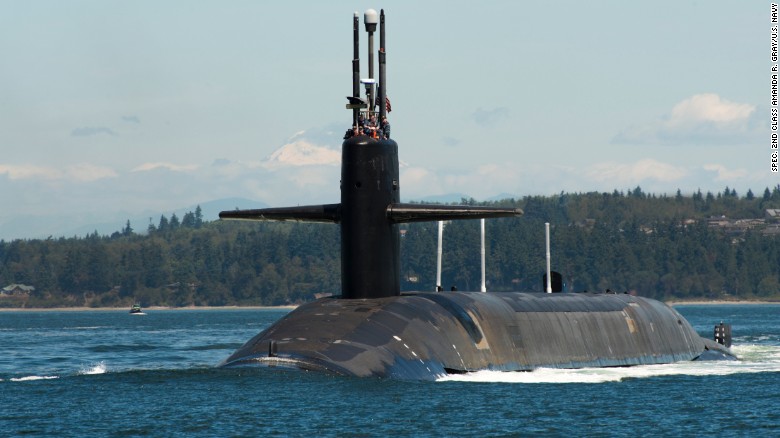The US military is sending a double-barreled message this week to potential adversaries in the Pacific.
A US Navy submarine carrying nuclear-tipped ballistic missiles is visiting Guam for the first time since the late 1980s and US and Japanese troops will practice amphibious landings on Pacific islands.
The submarine USS Pennsylvania (SSBN 735) is making what the Navy formally calls a “scheduled port visit” to the US territory in the Pacific, according to a Navy press statement.

But a US defense official says that both Japanese and South Korean delegations are in Guam at this time and will be offered rare tours of the submarine.
The visit comes as military tensions are high both with North Korea over its nuclear program, and China, over its moves in the South China Sea.
The Navy is making the public statement about the Pennsylvania in part to show its presence to allies and adversaries in the region.
“This specific visit to Guam reflects the United States’ commitment to its allies in the Indo-Asia-Pacific, and complements the many exercises, training, operations, and other military cooperation activities conducted between the US and its partner nations,” the Navy said in its statement.
“Ballistic missile submarines such as USS Pennsylvania are on patrol continuously, providing a critical, stabilizing and highly effective element of the US nuclear deterrence force.”
The Pennsylvania, one of 14 Ohio-class ballistic missile submarines in the US fleet, carries 24 Trident II D-5 ballistic missiles, according to the US Navy. Each missile carries multiple warheads which can be programmed to hit different targets.
37,000 Japanese and US troops in drills
The amphibious landings, meanwhile, are part of Exercise Keen Sword 17, involving 11,000 US and 26,000 Japanese troops. They will take place around Japan, Okinawa, Guam and the island of Tinian in the Northern Marinas.
“Significant training activities during KS17 will include air and sea operations, integrated air and missile defense and ballistic missile defense in order to keep pace with the growing ballistic missile threat in the Indo-Asia-Pacific region,” said a statement from US Forces Japan.
Keen Sword has been held yearly since 1986 but this is the first year that it will include amphibious landings.
“Amphibious operation training offers an opportunity to build bilateral interoperability in this area, and it supports Japan’s developing amphibious capabilities,” the US military statement said.
The amphibious exercise comes amid tensions between Japan and China over the disputed island chain off China’s east coast that Japan refers to as the Senkakus and China as the Diaoyus.
Both countries have put the islands in their Air Defense Identification Zones and flights over and ship transits around the islands by both countries have been contentious.
Keen Sword has already drawn reaction from Beijing, with a report posted on the website of state broadcaster China Central Television (CCTV.)
“Okinawa will stage a scenario in which the US is at war with a third party and Japan offers its assistance,” the CCTV report said.
“Analysts say this is to prepare Japan’s Self-Defence Forces for involvement in similar situations,” it added.
The Japanese Self Defense Force said along with their 26,000 troops, 260 aircraft and 20 warships will be involved in the exercises.
US Marines have deployed on Japan’s 13,950-ton helicopter destroyer JS Hyuga, the flagship of the four-ship Japanese task force involved in the exercise, a US Navy statement said.
As reported by CNN
